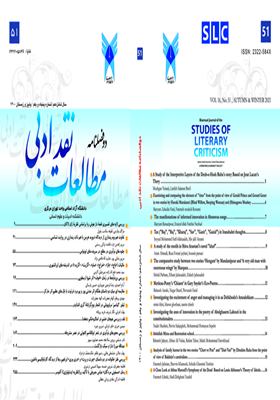Tax ("Baj", "Baj", "Kharaj", "Sav", "Gazit", "Gazid") in Iranshahri thoughts
Subject Areas : مطالعات نقد ادبیseyyed mohammd fath ollahzade 1 * , Mir jalil Akrami 2
1 - PH.D Student Persian Language and Literature, Faculty of Persian Language and Literature, Tabriz University, Tabriz, Iran
2 - Assistant Professor Persian Language and Literature, Faculty of Persian Language and Literature, Tabriz University, Tabriz, Iran
Keywords: tax, Shahriar, Ransom, Iranshahr, tribute,
Abstract :
In the tax system, ransom and tribute were an important source of income for Iranshahr. These resources were provided through the payment of ransom and tribute from the people inside the country, or through the extortion and tribute of the princes of Iranshahri from the kings of other countries. In this regard, most of the rulers and kings of the lands and kingdoms played a significant role. In the mythology of Iran, lands such as Hamavaran, China, India, etc. were among the ransom paying countries of Iranshahris; Of course, some countries were either at war or at peace with Iranians. In any case, the powerful princes of Iran used to collect ransom and tribute from these countries and other kingdoms. In this study and research, while examining and extracting "ransoms", "tributes" and how to collect and pay tribute and the quality of its use in the construction and settlement and security of Iranshahr, it has been tried. The political relations and the behavior of the princes of Iranshahr in taking taxes (extortion and tribute) in peacetime or during war in dealing with the rulers and kings of different countries and kingdoms of the world and the people of Iranshahr should be evaluated. In the meantime, the attention and opinions of the Shahriars of Iranshahr have been more in collecting ransom and tribute from the people of Iranshahr.
ابن بلخی.(1374). فارسنامه، تصحیح و تحشیه فسایی رستگار،منصور، چاپ نخست، شیراز، بنیاد فارس شناسی.
اسدی طوسی، حکیم ابونصر علی بن احمد.(1354). گرشاسپ نامه، به اهتمام یغمایی، حبیب، چاپ اول، تهران، کتاب خانه بروخیم.
بلعمی، ابوعلی، محمد.(1380). تاریخ بلعمی، به تصحیح بهار، محمد تقی، به کوشش پروین گنابادی، محمد، چاپ اول، تهران، انتشارات زوار.
دقیقی طوسی، ابو منصور محمد ابن احمد.(1368). دیوان دقیقی طوسی، به اهتمام: شریعت، محمد جواد، چاپ اول، تهران، انتشارات اساطیر.
دینوری، ابو حنیفه، احمد بن داوود.(1390). اخبار الطوال، ترجمه: مهدوی دامغانی، محمود، چاپ هشتم، تهران، نشر نی.
رواقی، علی.(1390). فرهنگ شاهنامه، 2جلدی، چاپ اول، تهران، انتشارات فرهنگستان هنر.
سرمدی، مجید، مصحح.(1382). فرامرزنامه(مولف ناشناس)، چاپ اول، تهران، انجمن آثار ومفاخر فرهنگی.
فردوسی.(1373). شاهنامه، 4جلدی (از روی چاپ مسکو) به کوشش و زیر نظر: حمیدیان، سعید، چاپ اول، تهران، نشر قطره.
فردوسی.(1376). شاهنامه، 8 جلدی، (ژول مول)، چاپ پنجم، تهران، موسسۀ انتشارات امیر کبیر.
فردوسی.(1394). شاهنامه 4 جلدی، ویرایش: خالقی مطلق، جلال، چاپ اول، تهران، انتشارات سخن.
مختاری غزنوی، عثمان.(1377). شهریار نامه، به کوشش و اهتمام بیگدلی، غلامحسین، چاپ اول، تهران، سازمان چاپ و انتشارات وزارت فرهنگ و ارشاد اسلامی.
مسعودی، ابوالحسن علی بن حسین.(1365). التنبیه و الاشراف، ترجمه: پاینده، ابوالقاسم، چاپ دوم، تهران، انتشارات علمی و فرهنگی.
مسکویه رازی، احمد بن محمد.(1369). تجارب الامم، جلد یکم، ترجمه: امامی، نصرالله، چاپ اول، تهران، سروش.
طاهری عبدوند،آمنه.(1377). «باژ » و «ساو» درشاهنامه،نامه پارسی،شماره 10،تهران،صص120-108.
عرب، حسنعلی وصادقی، حسین.(1392). «برآورد درآمدهای مالیاتی دولت ساسانی»، پژوهش نامه تاریخ، سال هشتم، شماره ی سی ودوم ، تهران،صص109-89.
میرزایی، علی اصغر.(1394). « بررسی نظام مالیاتی ساسانی واصلاحات مالی خسرو انوشیروان» فصل نامه پژوهش های تاریخی، سال هفتم، شماره دوم، تهران، صص124-109.
_||_
